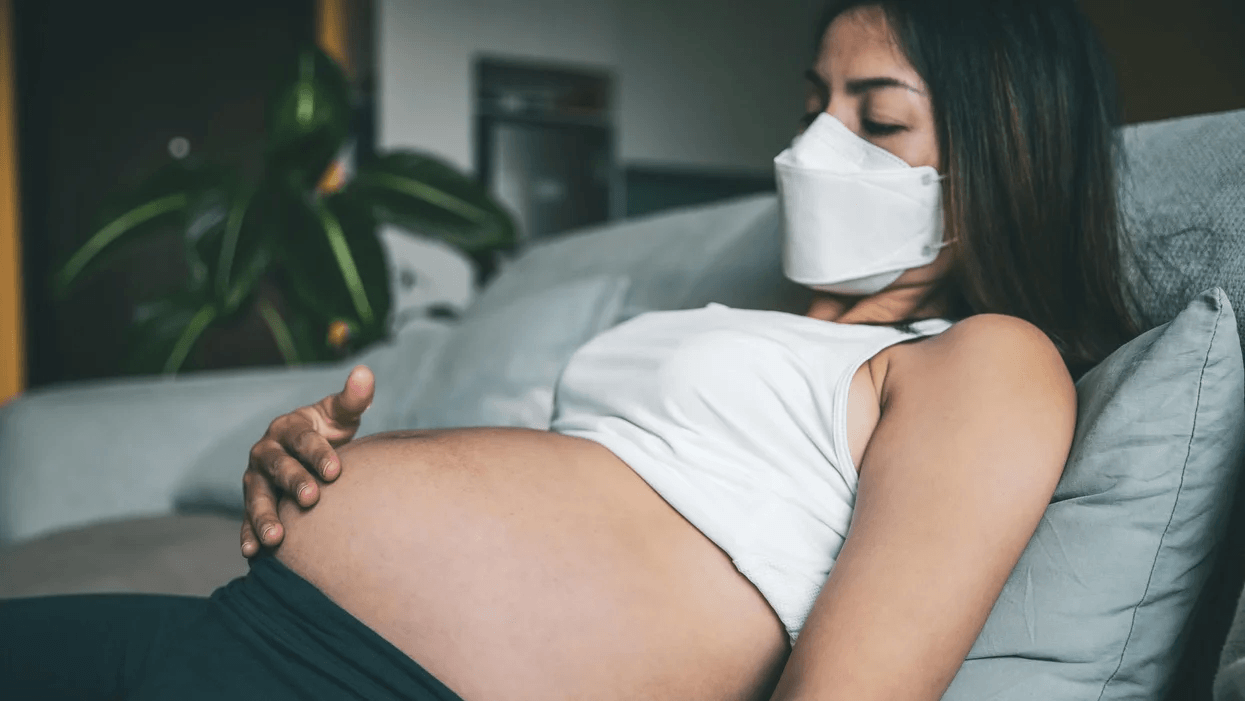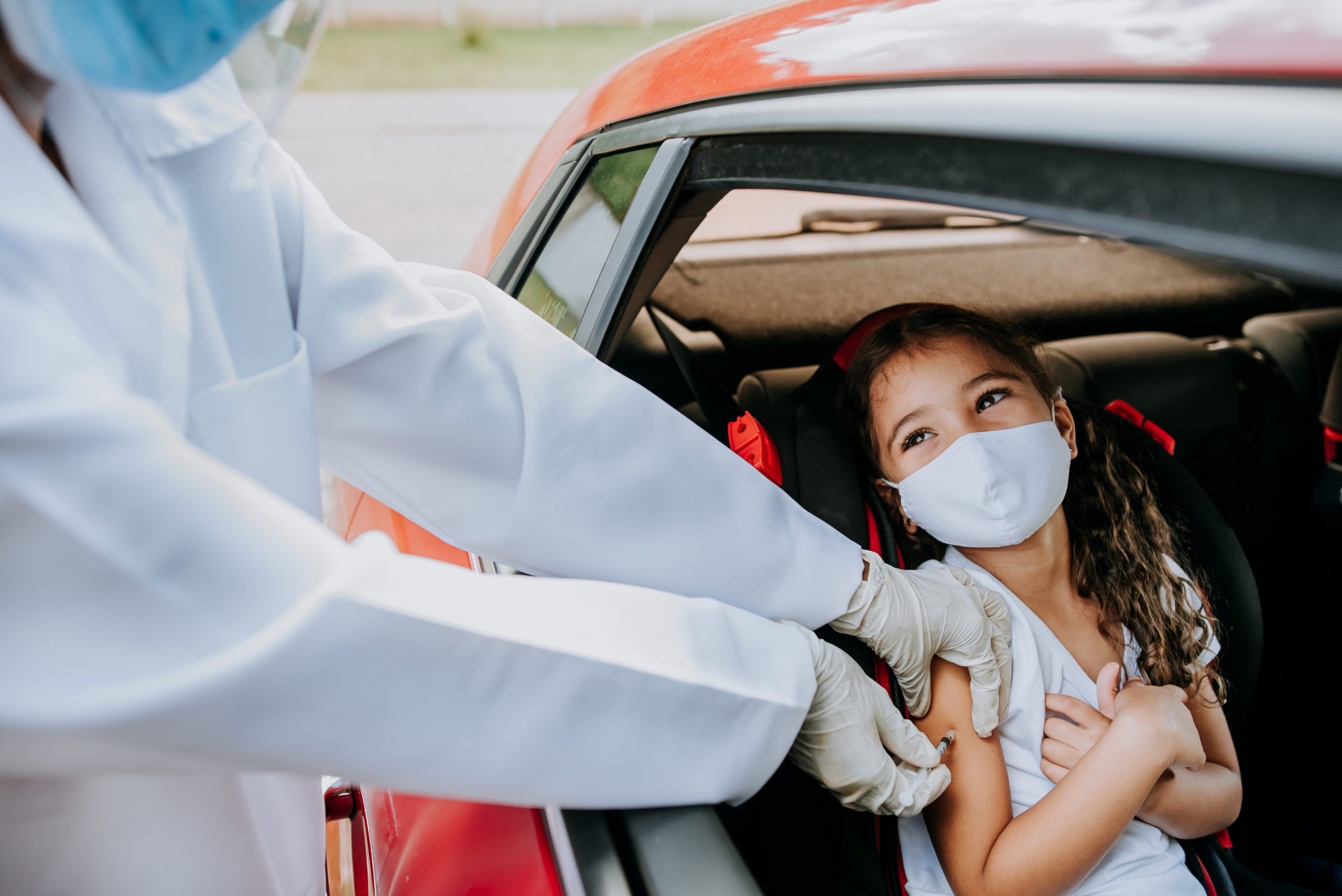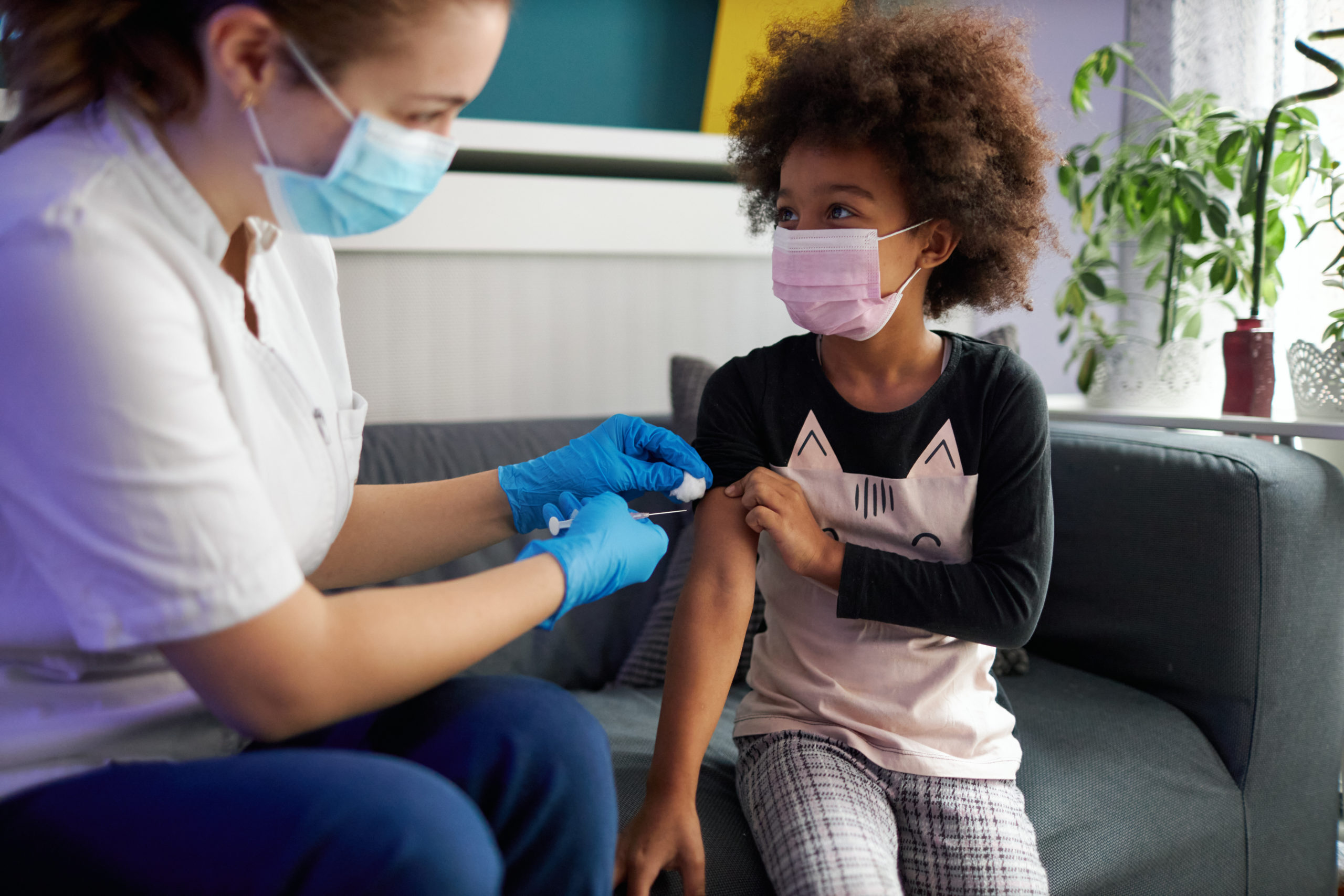The Covid vaccine does not affect fertility, but getting Covid does, study shows
We fact-checked the myths surrounding the Covid vaccine and fertility so you can make the most informed choices for your family.

This article is sponsored by the U.S. Department of Health and Human Services. Thank you for supporting the brands that support Motherly and mamas.
In This Article
- New study shows Covid vaccines do not impact fertility
- Experts bust myths about the Covid vaccine and infertility
- MYTH: The mRNA Covid vaccines can change DNA, affecting your (or your child's) future fertility.
- MYTH: The Covid vaccine harms the placenta in pregnancy.
- MYTH: The Covid vaccine lowers sperm count.
- MYTH: The Covid vaccine can cause miscarriage.
- MYTH: A vaccinated person can shed the virus onto a nearby unvaccinated person, causing illness or reproductive issues like irregular periods.
- MYTH: Antibodies from a Covid infection protect you just as well as the vaccine can from future infections.
- Real risks to fertility exist from getting the Covid virus, not the vaccine
Getting back to a routine starts with a vaccine. Safe and effective for children 6 months and older, COVID vaccines help give them the best protection. Vaccines are easy to find and are free for everyone living in the United States. Find a vaccine near you at vaccines.gov.
As the pandemic rages on, Covid vaccine rollouts across the U.S. have brought waves of relief to millions—but the tide also has a dark side. Countless myths have surfaced regarding the vaccines’ safety, especially when it comes to fertility.
While it’s understandable that parents may be worried about vaccine side effects in themselves or their kids (children aren’t just tiny adults, after all), we have zero evidence that the mRNA technology used in the Pfizer or Moderna vaccines affect fertility in any way.
New study shows Covid vaccines do not impact fertility
A Jan. 2022 study of 2,126 women published in the American Journal of Epidemiology found that getting the Covid vaccine did not reduce the chances of getting pregnant as compared to unvaccinated women. Results were similar whether women received one or two doses, either type of Covid vaccine or how recently they received their shot(s).
But the study also highlighted the finding that a woman had an 18% lower chance of getting pregnant if her male partner had been infected with Covid in the past 60 days. This shows that while Covid vaccines do not impact fertility, Covid infection does, albeit in the short-term. There was no difference in pregnancy chances when male partners tested positive more than 60 days before conception.
“The findings provide reassurance that vaccination for couples seeking pregnancy does not appear to impair fertility,” says Diana Bianchi, M.D., director of NIH’s Eunice Kennedy Shriver National Institute of Child Health and Human Development, which funded the study, in a statement.
While the effects of Covid infection on male fertility could be related to fever or inflammation in the testes or erectile dysfunction after infection, the researchers noted that these symptoms could potentially be avoided with Covid vaccination. Vaccination and boosters can also offer protective benefits to mother and fetus during pregnancy, as pregnancy and up to 40 days postpartum is considered a high-risk time period for severe disease from Covid.
Experts bust myths about the Covid vaccine and infertility
Vaccines in general have a long and storied history of being entwined with fertility fears—and the prevalence of social media has only added fuel to that fire, making false claims and misinformation about the Covid vaccine spread further, faster.
We’re sharing the evidence-based answers that debunk the biggest myths out there. Here’s what you need to know about the Covid vaccine and infertility.
MYTH: The mRNA Covid vaccines can change DNA, affecting your (or your child’s) future fertility.
FACT: mRNA vaccines do not enter the nucleus of the cell, where DNA is contained.
The mRNA vaccines use messenger RNA to help your body’s immune system defend against the virus. The vaccines instruct your cells to create a protein that’s part of the SARS-CoV-2 coronavirus, which helps your body recognize and ward off the virus if you come into contact with it. But they don’t have access to your DNA, which resides in the nucleus of the cell, say experts from Johns Hopkins, Lisa Maragakis, M.D., M.P.H., senior director of infection prevention, and Gabor Kelen, M.D., director of the Johns Hopkins Office of Critical Event Preparedness and Response.
The mRNA breaks down after it tells the cells to make the proteins to stimulate an immune response. Your DNA remains unaffected.
“Both the Pfizer-BioNtech and Moderna vaccines are not live virus vaccines. They do not enter the nucleus and cannot cause any genetic changes,” ACOG’s Vice President Dr. Christopher Zahn, MD, told Motherly. This type of vaccine technology has been in development for nearly two decades, which allowed for a quick response when the pandemic hit.
MYTH: The Covid vaccine harms the placenta in pregnancy.
FACT: The vaccine does not cause the body to attack the placenta.
When the vaccines were first made available, a false claim started making the rounds on social media that the vaccines instructed the body’s immune system to create a spike protein that would attack another similarly shaped spike protein, syncitin-1, which is involved in the growth of the placenta during pregnancy.
“The two spike proteins are completely different and distinct, and getting the Covid-19 vaccine will not affect the fertility of women who are seeking to become pregnant, including through in vitro fertilization methods,” write Dr. Maragakis and Dr. Kelen.
“During the Pfizer vaccine tests, 23 women volunteers involved in the study became pregnant, and the only one who suffered a pregnancy loss had not received the actual vaccine, but a placebo,” write Dr. Maragakis and Dr. Kelen.
MYTH: The Covid vaccine lowers sperm count.
FACT: Studies have not shown that vaccines decrease sperm count.
A study published in JAMA found that there was no statistically significant decline in sperm count for men who received an mRNA vaccine. The study followed 45 healthy men with no prior fertility issues. Their sperm count was monitored before receiving their first dose of an mRNA vaccine, and again 70 days after receiving their second shot. Researchers found no decreases in sperm count among the study participants.
In fact, in several men, they noted an increased sperm count after vaccination—but this effect wasn’t necessarily attributed to the vaccine.
“One of the biggest myths with the vaccine was that it could affect fertility,” says Ranjith Ramasamy, director of reproductive urology at the University of Miami and one of the authors of the study. Finding no negative effect on sperm counts “was very reassuring,” he told Scientific American.
MYTH: The Covid vaccine can cause miscarriage.
FACT: Several studies have shown that the vaccine doesn’t raise miscarriage risk.
Three recent studies have shown that pregnant women who receive at least one dose of the Covid vaccines were no more likely to have a miscarriage than those who were unvaccinated.
A letter published in JAMA in September 2021 about one of the recent studies explained that of the 105,446 pregnancies analyzed, overall, miscarriages were no more likely within a month of vaccination than in the unvaccinated group, regardless of gestational age and vaccine type.
Another landmark study in the New England Journal of Medicine in June 2021 found that the miscarriage rate among those pregnant women who were vaccinated was within the range of expected miscarriage in the general population, at 12.5%.
MYTH: A vaccinated person can shed the virus onto a nearby unvaccinated person, causing illness or reproductive issues like irregular periods.
FACT: The Covid vaccines do not contain live—or even killed—forms of the virus, which means there’s no virus to shed.
While “vaccine shedding” is a phenomenon that can happen with some vaccines containing weakened forms of live viruses (like in the chickenpox vaccine, though this still doesn’t mean shedding will cause disease), the Covid-19 vaccines do not contain any form of the virus, which means there’s no possible vaccine or virus shedding that can occur.
“None of the Covid-19 vaccines contain the live virus that causes Covid-19 so a COVID-19 vaccine cannot make anyone sick with Covid-19, including pregnant people or their babies,” says the CDC.
In fact, the opposite is true: Being near someone who has been vaccinated actually provides protection against the virus, as the vaccine helps prevent the spread of disease.
MYTH: Antibodies from a Covid infection protect you just as well as the vaccine can from future infections.
FACT: Evidence shows getting a Covid vaccine is the best way to prevent future infection, regardless of having a previous infection.
While having recovered from a previous Covid infection confers some antibody protection, a study published in August 2021 shows that if you had Covid before and are not now vaccinated, your risk of getting a new Covid infection is more than two times higher than for those who were previously infected and then got vaccinated. That’s a pretty serious risk to take on.
Experts don’t know how long the immunity conferred from a previous infection will last—and it may vary from person to person. To reduce your risk of getting reinfected, vaccination is your safest bet.
Real risks to fertility exist from getting the Covid virus, not the vaccine
“There is currently no evidence that any vaccines, including Covid-19 vaccines, cause fertility problems in women or men,” the CDC says.
However, very real risks to fertility do exist as a result of contracting the virus itself.
A meta-analysis protocol submitted to the British Medical Journal’s BMJ Open in Feb. 2021 states that Covid infection may cause male infertility, as sperm are particularly susceptible to virus attack. The full report has yet to be published, but the researchers note in their initial submission that “some studies have shown that SARS-CoV-2 might affect female fertility and disturb female reproductive functions… Accumulating evidence now suggests that [Covid] may interfere with the female reproductive functions, leading to menstrual disorder, infertility and fetal distress.”
The study’s authors report that “Covid-19 is usually accompanied by high levels of interleukin (IL)-6, IL-8, tumor necrosis factor-α and other cytokines, which trigger a procoagulant state that is unfavorable to the development of blastocyst or fetus in a normal human uterus.”
More research is needed in this area, but the current research that we do have makes a strong case for the benefits of vaccination over the risks of infection. If you still have concerns about infertility, be sure to talk to your doctor.
Sources
Cavanaugh AM, Spicer KB, Thoroughman D, Glick C, Winter K. Reduced Risk of Reinfection with SARS-CoV-2 After COVID-19 Vaccination – Kentucky, May-June 2021. MMWR Morb Mortal Wkly Rep. 2021;70(32):1081-1083. Published 2021 Aug 13. doi:10.15585/mmwr.mm7032e1
Johns Hopkins Medicine: Health. Covid-19 Vaccines: Myth vs. Fact. Updated Sept. 23, 2021.
Kharbanda EO, Haapala J, DeSilva M, et al. Spontaneous Abortion Following COVID-19 Vaccination During Pregnancy. JAMA. Published online September 08, 2021. doi:10.1001/jama.2021.15494
Li F, Lu H, Zhang Q, et al. Impact of COVID-19 on female fertility: a systematic review and meta-analysis protocol. BMJ Open 2021;11:e045524. doi: 10.1136/bmjopen-2020-045524
Shimabukuro TT, Kim SY, Myers TR, Moro PL, Oduyebo T, Panagiotakopoulos L, Marquez PL, Olson CK, Liu R, Chang KT, Ellington SR. Preliminary findings of mRNA Covid-19 vaccine safety in pregnant persons. New England Journal of Medicine. 2021 Jun 17;384(24):2273-82.
Wesselink AK, Hatch EE, Rothman KJ, Wang TR, Willis MD, Yland J, Crowe HM, Geller RJ, Willis SK, Perkins RB, Regan AK. A prospective cohort study of COVID-19 vaccination, SARS-CoV-2 infection, and fertility. American Journal of Epidemiology. 2022 Jan 20.
A version of this story was originally published on Sept. 25. It has been updated.


